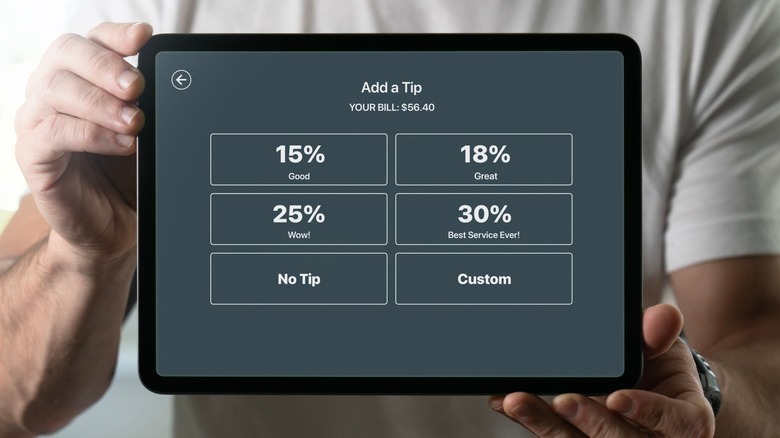The Only Time It's Acceptable To Leave A Bad Tip
Tipping is so embedded in our society that it can feel like you've got no choice but to always leave a great tip. Typically, the right thing to do is leave around 20% no matter what — especially since services rely on teamwork, which is one of the most important things to remember when tipping. Just because one team member let you down doesn't mean another didn't do a great job. Similarly, so many workers depend on tips to supplement low wages. In fact, it's estimated that 3 to 4 million Americans rely on tips to earn an acceptable income. However, with that said, there are certain occasions when it's acceptable to leave a bad tip.
I worked as a waitress for four years and saw the good, the bad, and the ugly with guests tipping. But I'll also hold my hands up and say that sometimes a bad tip is justified. As a general rule, if your dining experience is negative from start to finish with no assistance from your server, nobody expects you to tip generously. Whereas, if one aspect of your experience is negative, such as slow service or a wrong order, but it's rectified, it may be fair to still tip graciously. Serving is all about conflict resolution and problem-solving, so if your server did this effectively, why wouldn't you reward their efforts?
What other occasions warrant a bad tip?
Tipping well doesn't just depend on whether wait staff effectively iron out any hiccups in your dining experience. What about if your wait staff is the issue itself with your dining experience? Other occasions that warrant a bad tip include instances where your relationship breaks down with your server. Any rudeness or veiled insults deserve a one-way ticket to a poor tip. If a server snaps at you, calls you names, or shows any form of discrimination, that's a hard "no" on a 20% tip. Your server should be on your side, and if it doesn't feel that way, it's okay to knock a percentage off your final amount to reflect that.
Ultimately, tipping is a personal gesture and depends entirely on the relationship you build with serving staff. Knowing how much to tip at a fancy restaurant or a casual venue is tricky. Ultimately, as a recent study shows, tipping is a subjective decision for Americans. However, it's important to remember that tipping isn't just a mere sign of gratitude but a safety net for many who are financially reliant on customer tips. Play it fair; judge your server as an individual role in your dining experience, not the face of the company.

